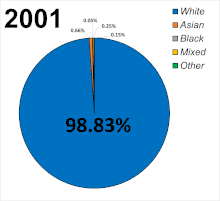Demography of Belfast
The city of Belfast is the provincial capital of Northern Ireland. The population of Belfast was 345,418 in 2021.
| Demographics of Belfast | |
|---|---|
 Population pyramid of Belfast | |
| Population | 345,418 (2021) |
Population

Population
| Year | Pop. | ±% p.a. |
|---|---|---|
| 1757 | 8,549 | — |
| 1782 | 13,105 | +1.72% |
| 1791 | 18,320 | +3.79% |
| 1806 | 22,095 | +1.26% |
| 1821 | 37,277 | +3.55% |
| 1831 | 53,287 | +3.64% |
| 1841 | 75,308 | +3.52% |
| 1851 | 97,784 | +2.65% |
| 1861 | 119,393 | +2.02% |
| 1871 | 174,412 | +3.86% |
| 1881 | 208,122 | +1.78% |
| 1891 | 255,950 | +2.09% |
| 1901 | 349,180 | +3.15% |
| 1911 | 386,947 | +1.03% |
| 1926 | 415,151 | +0.47% |
| 1937 | 438,086 | +0.49% |
| 1951 | 443,671 | +0.09% |
| 1961 | 415,856 | −0.65% |
| 1966 | 398,405 | −0.85% |
| 1971 | 362,082 | −1.89% |
| 1981 | 314,270 | −1.41% |
| 1991 | 279,237 | −1.17% |
| 2001 | 277,391 | −0.07% |
| 2006 | 267,374 | −0.73% |
| 2011 | 286,000 | +1.36% |
| 2014 | 333,000 | +5.20% |
| [1][2][3][4][5][6][7] | ||
The total population of Belfast was 345,418 in 2021, an increase of 3.5%.[8]
Sex
In 2021, 51% of the population was female while 49% was male.[8]
Age

The age demographics of Belfast is different to the rest of the constituent country, 18% were aged 0 to 14, 37% aged 15 to 39, 30% aged 40 to 64 and 15% aged 65 and above.[8]
Ethnicity


Belfast has become in recent decades an ethnically diverse city, although this ethnic diversity is not to the same scale as other cities across the United Kingdom. Previously, the city was exclusively white (categorised as a simplified ethnic group within Northern Ireland) at 98% white in 2001, however by 2021, this had dropped down to 93%.[8]
Migration
Country of birth
84% of Belfast was born within Northern Ireland, 4% within England, less than 1% for Scotland and Wales, 2% within the Republic of Ireland and 10% from other countries.[8]
Passports held
43% of Belfast has a UK passport only, 29% has a Republic of Ireland passport only, 6% has both UK and RoI (Republic of Ireland) passports, 8% have other passports and 14% have no passport.[8]

Religion
Similarly to the trend across all of Northern Ireland, the Protestant population within the city has been in decline, while the non-religious, other religious and Catholic population has risen. In 2021, the proportion of residents who identified as Catholic was 43%, 12% Presbyterian, 8% for the Church of Ireland, 3% Methodist, 6% of Christian religions, 3% other religions and 24% no religion or not stated.[8]
Identity

In 2021 the largest identity group was 'Irish only' with 35% of the population. After this was; British only 27%, Northern Irish only 17%, British and Northern Irish only 7%, Irish and Northern Irish only 2%, British, Irish and Northern Irish only 2%, British and Irish less than 1% and Other identities with 10%.[8]
References
- Wakefield, Edward (1812). An account of Ireland, statistical and political: in two volumes. Vol. 2. London: Longman, Hurst, Rees, Orme and Brown. pp. 693–694. Archived from the original on 31 December 2015. Retrieved 16 October 2015.
- "Census for post 1821 figures". Cso.ie. Archived from the original on 20 September 2010. Retrieved 12 August 2010.
- "Home". Histpop.Org. 2 April 2007. Archived from the original on 7 May 2016. Retrieved 13 November 2010.
- "Northern Ireland Census of Population". Northern Ireland Statistics and Research Agency. Archived from the original on 4 April 2010. Retrieved 12 August 2010.
- Lee, J. J. (1981). "On the accuracy of the Pre-famine Irish censuses". In Goldstrom, J. M.; Clarkson, L. A. (eds.). Irish Population, Economy, and Society: Essays in Honour of the Late K. H. Connell. Oxford, England: Clarendon Press.
- Mokyr, Joel; O Grada, Cormac (November 1984). "New Developments in Irish Population History, 1700–1850". The Economic History Review. 37 (4): 473–488. doi:10.1111/j.1468-0289.1984.tb00344.x. hdl:10197/1406. Archived from the original on 4 December 2012.
- "Belfast City Council. Belfast: A Profile of the City. Demographics". Belfastcity.gov.uk. Archived from the original on 25 September 2010. Retrieved 12 August 2010.
- "Belfast Census Data". explore.nisra.gov.uk. Retrieved 2022-09-27.